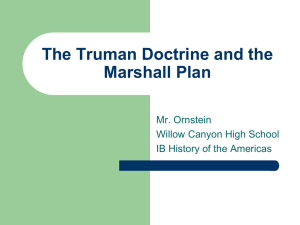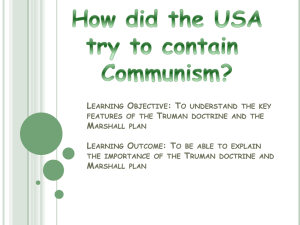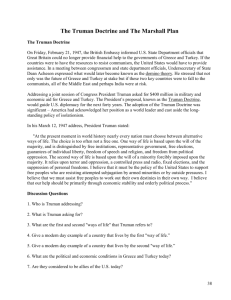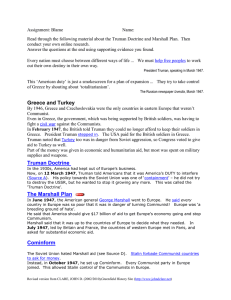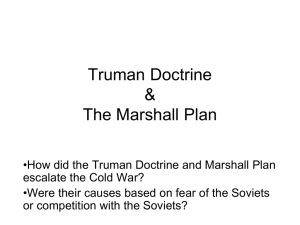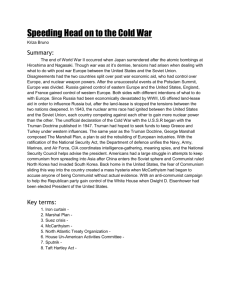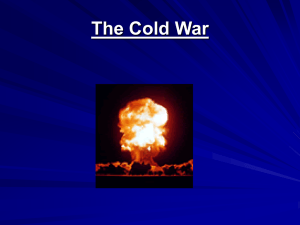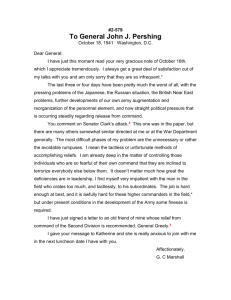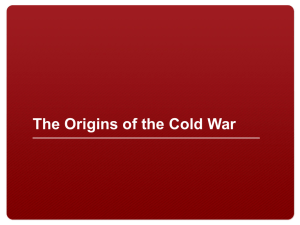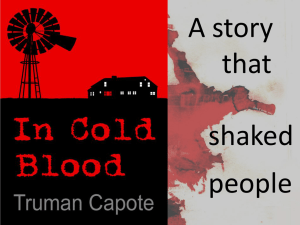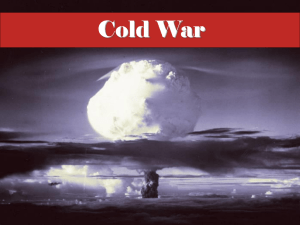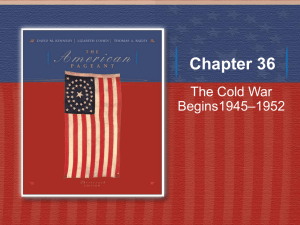Why did the tensions between the Allies turn into a Cold War?
advertisement
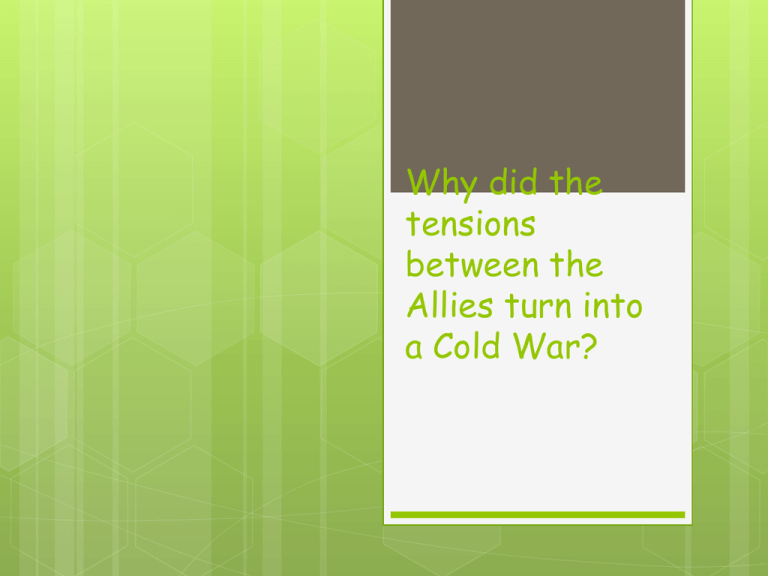
Why did the tensions between the Allies turn into a Cold War? Starter President Truman, writing to his secretary of State in January 1946 “Unless Russia is faced with an iron fist and strong language, another war is in the making. Only one language do they understand – ‘how many (army) divisions have you got?...I'm tired of babying the Soviets” Extract from a report by the British Foreign Secretary to the British Cabinet in March 1948. The report was titled ‘The threat to Civilisation’ “The Soviet government is not prepared to co-operate with any non communist government in eastern Europe, but it is actively preparing to extend its hold over the remaining part of continental Europe and subsequently, over the middle east and no doubt the far east as well. In other words, physical control of Europe and Asia and eventual control of the whole world, is what Stalin is aiming at” What has changed in the 2 years that separate these two sources? Homework Which country had the more successful policies in Europe between 1945 and 1949; the USA or the USSR? (10) Soviet Policy US Policy Where was Stalin successful? • Spreading communism • Preventing free elections • Czechoslovakia Where was Truman successful? • Berlin • Marshall Plan Where did Stalin fail? • Greece • Yugoslavia Where did Truman fail? US Policy, 1945-1948 Lesson Objectives – To understand the actions of America after WWII, specifically, the Truman Doctrine and the Marshall Plan. Learning Outcomes – All will demonstrate understanding of a range of key terms and will have these defined and explained in your book. Developed responses to a range of political cartoons. 10 mark essay question completed for homework. Add the following terms to your glossary sheet Doctrine Congress Aggressor Containment Truman Doctrine Marshall Plan Cominform Your task is to have all of these key words defined and explained by the end of the lesson! Greece By 1946, Greece and Czechoslovakia were the only countries in eastern Europe that weren’t Communist. Even in Greece, the government, which was being supported by British soldiers, was having to fight a civil war against the Communists. In February 1947, the British told Truman they could no longer afford to keep their soldiers in Greece. President Truman stepped in. The USA paid for the British soldiers in Greece Doctrine: a belief. Congress: the American ‘parliament’. Aggressor: someone who starts a quarrel. Containment: holding something in – stopping the USSR growing The Truman Doctrine American intervention in Greece revealed a new attitude to world politics known as the ‘Truman Doctrine’ This meant ‘containing’ the spread of communism – “keeping the lid” on America accepted that the East was communist but wanted to stop it spreading any further. This involved America sending money, equipment and advice to any country which was under threat of a communist take over. The Marshall Plan Truman believed that people turned to communism when they were in poverty. George Marshall, the American, assessed the economic state of Europe and his findings were alarming. Europe still owed $11.5 billion to the USA. There was still rationing and coal shortages. Marshall suggested that $17 billion was needed to rebuild Europe. The money was not given immediately, it was a huge amount of money!! “Our policy is directed against hunger, poverty, desperation and chaos” How could Stalin interpret this? Czechoslovakia Marshall Aid was granted after the alarming events in Czechoslovakia. The communists took over the government. AntiSoviets were purged. One pro-American Minister, Jan Masaryk, was found dead beneath an open window. The communists said he had jumped, the Americans suspected that he had been pushed. Immediately, Congress accepted the Marshall Plan and made $17billion available over the next 4 years. Task You are an advisor to Stalin. Write a briefing paper on America’s plans for Europe. Your report should mention: President Trumans’ plans for Europe The methods being used by Truman to resist the spread of communism Whether or not you think that The USSR should be worried. An American cartoon, 1947 Are these political cartoons supportive or critical of Marshall Aid? A Soviet cartoon commenting on Marshall Aid. The rope is the ‘Marshall Plan’ and the lifebelt is ‘Aid to Europe’ Homework http://www.schoolhistory.co.uk/lessons/c oldwar/coldwar_truman.html Print out the diagram and make sure that it is stuck into your exercise book by next lesson. You must learn all the key facts for a test!!!
